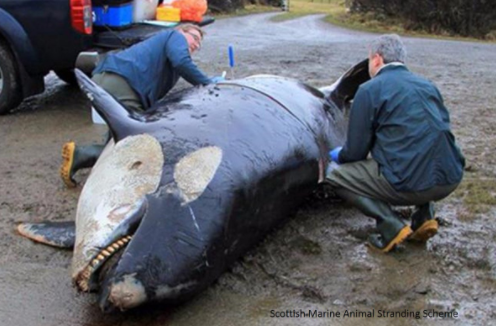Most Polluted Animal On Earth: Dead Killer Whale Washes Up In Scotland

A dead killer whale that washed up on the shore of a Scottish island last January was the most polluted animal ever seen on Earth, according to a newly released report. The whale had the highest levels of polychlorinated biphenals, or PBCs, ever recorded in an animal, according to the Scottish Marine Animal Stranding Scheme.
An analysis of the orca, who scientists named Lulu, revealed that her blubber had concentrations of PBC 100 time higher than the threshold for marine mammals. And despite being at least 20 years old, the whales ovaries showed she had never reproduced, likely the result of such a toxic concentration of pollutants in her body.
Read: 'Extraordinary' Levels Of Pollution Found In Deepest Parts Of Ocean
“Previous studies have shown that killer whale populations can have very high PCB burdens, but the levels in this case are some of the highest we’ve ever seen,” said Dr. Andrew Brownlow, head of the Scottish Marine Animal Stranding Scheme. “We know Lulu died from becoming entangled, but given what is known about the toxic effects of PCBs, we have to consider that such a high pollutant burden could have been affecting her health and reproductive fitness.”
Post mortem carried out by Scottish Marine Animal Stranding Scheme after #orca #stranding in #Shetland: https://t.co/JfFz8mf5Js pic.twitter.com/N1jBFdc7EL
— Whale and Dolphin Conservation (WDC) (@whalesorg) January 21, 2017
PCBS, chemicals used in electrical and industrial equipment, were used liberally starting in the 1920s. From then until 1979, an estimated 1.5 billion pounds of PCBs were manufactured, according to the National Oceanic and Atmospheric Administration. The U.S. government banned the chemicals in 1979 after researchers discovered they were harmful to humans and the environment. But to this day, they’re still leaching into oceans and other habitats. Researchers found PCBs in the furthest reaches of the planet, more than 36,000 feet down in the ocean, according to a study published in February.
“Once PCBs get into the marine environment, they are difficult if not impossible to remove,” said Brownlow. “They accumulate through food webs and persist over time.”
Read: Dead Whale With Stomach Full Of Plastic Bags Found Beached
The pervasiveness of the chemicals does not bode well for the pod that Lulu came from. A small group of only eight whales typically seen off the west coast of Scotland, a recorded calf birth hasn’t been seen in the 23 years that scientists have been monitoring it.
“Lulus apparent infertility is an ominous finding for the long term survivability of this group. With no new animals being born, It is now looking increasingly likely that this small group will eventually go extinct,” said Brownlow. “One of the factors in this group’s apparent failure to reproduce could be their high burden of organic pollutants.”
© Copyright IBTimes 2024. All rights reserved.





















